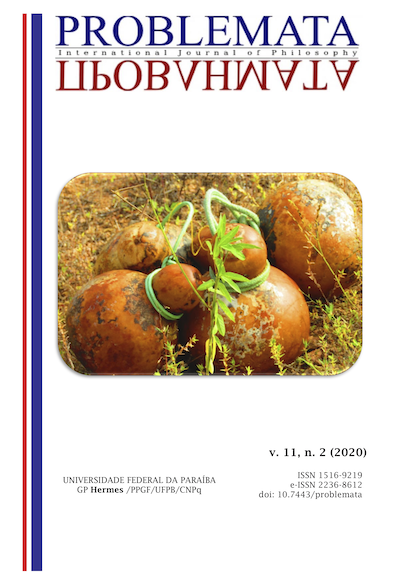QUILOMBO AS A CONCEPT IN MOTION OR QUILOMBISM AND UBUNTU:
AFRICAN ANCESTRAL PRACTICES TO RETHINK PEDAGOGICAL AND JUSTICE PRACTICES
DOI:
https://doi.org/10.7443/problemata.v11i2.53629Keywords:
Quilombo, Justice, Ubuntu, Ancestral knowledgeAbstract
Based on the studies by Beatriz Nascimento [1985; 1987], who understands quilombo as a concept in motion, I intend to present some reflections on the importance of this understanding in order to rethink our pedagogical and justice practices. In the field of justice, this concept allows the understanding of the processes of formation of historical and contemporary quilombos in Africa and the diaspora. In the dialogue with the theories of justice and education, this concept also allows the identification of ubuntu philosophy (Ramose, 1999; São Bernardo 2016) in these territories, considering that the identity and ways of doing these communities are fundamentally collective and interdependent. In this sense, quilombism, as advocated by Abdias Nascimento (1980), enables the identification and development of pedagogical practices based on ancestral knowledge of African origin that aim to strengthen this type of humanity expressed in quilombos, which is (only) understood as a collectivity, whose existential dynamics occurs in movement and unity with the elements of nature. Following the perspective of valuing these knowledges and practices, the studies shared here demonstrate the potential to rethink our pedagogical and justice practices, based on the mode of humanity expressed and valued in quilombista territories, in order to feed worlds in which our full dignity is effectively contemplated.
Downloads
References
ACHINTE, Adolfo Albán. Pedagogías de la re-existencia. Artistas indígenas y
afrocolombianos. In. WALSH, Catherine (organizadora). Pedagogías decoloniales: prácticas
insurgentes de resistir, (re)existir y (re)vivir. Tomo I. Quito: Ediciones Abya Yala, 2013.
ALMEIDA, Silvio. Racismo estrutural. São Paulo: Sueli Carneiro; Pólen, 2019.
ASANTE, Molefi Kete. Afrocentricidade. Teoria da mudança social. Philadelphia:
Afrocentricity International, 2014.BRASIL, Decreto Presidencial nº 4.887. Brasília, 2003.
______. Constituição da República Federativa do Brasil. Brasília, 1988.
CARICOM. 10-point reparation plan. Reparation Comission, 2013. Disponível em
https://caricomreparations.org/ . Acessado em 28.06.2020.
DAVIS, Angela. Mulheres, raça e classe. São Paulo: Boitempo, 2016.
De GREIFF, Pablo. Justicia y reparaciones, en: Handbook of Reparations, Oxford
University Press, New York, 2006. Traducción al español de Magdalena Holguín,
DOVE, Nah. Mulherisma Africana. Uma teoria afrocêntrica. Tradução de Wellington Agudá.
Universidade Temple. In. Jornal de Estudos Negros, Vol. 28, № 5, Maio de 1998, 515-539.
Sage Publications.
GONZALEZ, Lélia. Primavera para as rosas negras: Lélia Gonzalez em primeira
pessoa... Diáspora Africana: Editora Filhos da África, 2018. 486 páginas. 1ª edição.
MENDONÇA, Guilerme Cruz. Considerações jurídicas sobre a preservação da cultura
Quilombola no Brasil In. Instituto do Patrimônio Artístico e Cultural (IPHAN), Dossiê
Quilombos, Departamento de Patrimônio Material, Ministério da Cultura. Rio de Janeiro,
MIRANDA, Claudia, RIASCOS, Fanny Milena Quiñones y ARBOLEDA, John Henry.
Pedagogías quilombolas y aprendizajes decoloniales en la dinâmica organizacional de las
poblaciones negras. In: Revista da ABPN, v. 8, n. 18 • nov. 2015 – fev. 2016, p.25-43.
NASCIMENTO, Abdias. Quilombismo. Documentos de uma militância pan-africanista. Rio
de Janeiro: Ipeafro, 2019.
NASCIMENTO, Maria Beatriz. Beatriz Nascimento, Quilombola e Intelectual:
possibilidade nos dias da destruição. Diáspora Africana: Editora Filhos da África, 2018.
ONU, Organização das Nações Unidas. Resolución nº 60/147, 2005. Disponível em
http://gddc.ministeriopublico.pt/sites/default/files/diretrizes-recursoreparacao.pdf . Acessado
em 27.06.2020.
OYĚWÙMÍ, Oyèrónkẹ. La invención de las mujeres. Una perspectiva africana sobre los
discursos occidentales del género. Bogotá: En la frontera, 2017.
RAMOSE, Mogobe B. “Globalização e Ubuntu”. In: SANTOS, Boaventura de Sousa e
MENESES, Maria Paula (orgs.). Epistemologias do Sul. São Paulo: Cortez, 2010, pp. 175-
SANTOS, Antônio Bispo. Colonização, quilombos. Modos e significados. UnB: Brasília,
SÃO BERNARDO, Sérgio. Kalunga e o direito: a emergência de um direito inspirado na
ética afro-brasileira. V ENADIR, GT nº1 – Justiça Restaurativa, mediação e administraçãode conflitos socioambientais: interfaces em antropologia e direito, 2017. Disponível em:
https://periodicos.ufpa.br/index.php/hendu/article/view/6017/4841 Acesso em 27.11.2018.
URASSE, Anin. Uma introdução aos 18 princípios do Mulherismo Africana. In. PANAFRICANISTAS, União dos Coletivos. Coleção Pensamento Preto: Epistemologias do
Renascimento Africano [Volume III]. Diáspora Africana: Editora Filhos da África, 2019, p.-
-315.
Downloads
Published
Issue
Section
License
Authors who publish with this journal agree to the following terms:
- Authors retain copyright and grant the journal right of first publication with the work simultaneously licensed under a Creative Commons Attribution License that allows others to share the work with an acknowledgement of the work's authorship and initial publication in this journal.
- Authors are able to enter into separate, additional contractual arrangements for the non-exclusive distribution of the journal's published version of the work (e.g., post it to an institutional repository or publish it in a book), with an acknowledgement of its initial publication in this journal.
-
- Authors are permitted and encouraged to post their work online (e.g., in institutional repositories or on their website) prior to and during the submission process, as it can lead to productive exchanges, as well as earlier and greater citation of published work (See The Effect of Open Access).





